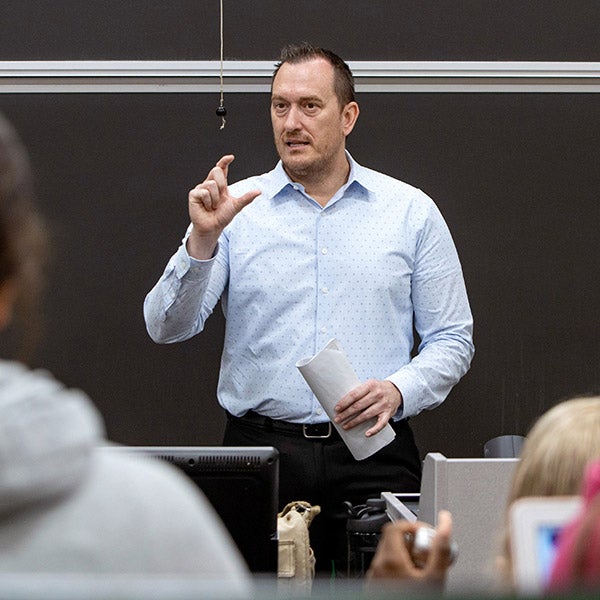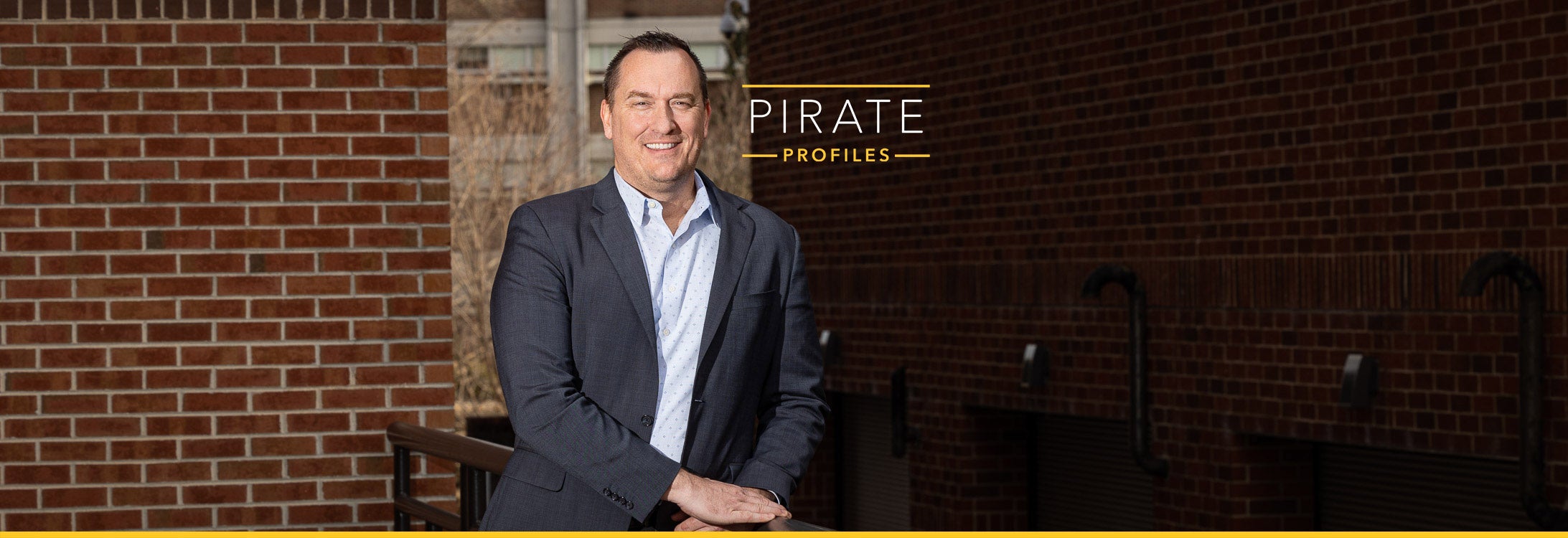Faculty: Dr. Jason Rowe
A can of peas may just be the reason behind Dr. Jason Rowe’s sales and marketing career. More specifically two cans of peas — for a dollar.
Rowe is an associate professor of marketing and supply chain management in East Carolina University’s College of Business.
He remembers drawing sketches of retail store layouts as a child growing up in Huntington, W.Va. He remained interested in business and became sold while working in a grocery store through college.
“There was a front wall in the store and customers would shop there and then go down the aisles, and my boss told me to go figure out what to put on the front wall,” Rowe said. “There were a ton of these canned peas in the back, and so I decided I was going to put these peas on the wall, and I asked my boss the price, and he said 49 cents a can. I priced them all and came back the next day, and not a single can was gone.
“I looked at that and thought, ‘Change the price.’ I changed it to two for a dollar, which actually increases the price by a penny a can, but I came back the next day and there were cans missing. People were buying two at a time because all of a sudden the two-for-a-dollar price grabbed their attention. That was my first big lightbulb moment using pricing to increase revenue, and pricing is a critical part of marketing.”

Dr. Jason Rowe teaches a class before the pandemic. (File photo by Rhett Butler)
After graduating from college with a degree in marketing from Marshall University, he told the story of the grocery store peas and other similar merchandising stories in his first job interview and was hired for a beer and wine sales position.
“Here I was just messing around in the grocery store, and it ends up becoming the thing that kicks off my career after college,” Rowe said. “It’s funny. You go through life, and sometimes you think, ‘This isn’t making any sense. Why am I doing this job?’ Now today when I look back over it, it all seems to fit together like a puzzle. It makes sense now.”
Rowe said two specific mentors were big pieces in his puzzle. First, an elementary school teacher, Sally Walker, encouraged him with public speaking. The experience and her encouragement boosted his confidence.
“I don’t know why, but she was focused on helping me,” he said. “Whether that was true or not, that’s how it made me feel. She would compliment me around other people and build me up. By the time I got out of sixth grade, public speaking was no problem. I felt I could do it, and from then on, I felt very comfortable speaking.”
He also credits Marshall University marketing professor Fred Mader for encouraging him to get a Master of Business Administration, and then years later, offering him the chance to teach a night marketing class at Marshall.
“I thought if I don’t like it, it’s only a semester and I’ll never do it again,” Rowe said. “I did it that fall semester and loved it and did it again in the spring and loved it. I called him up and said, ‘How do I do this full time?’
“The first class I ever had from him, I was probably 20, and I got my Ph.D. when I was 39, so for those roughly 20 years, he was there in key moments in time where I could have gone a different direction, and he guided me and nudged me in a different direction. And a slight change like that can change the long-term trajectory in a big way.”
After getting his doctorate, Rowe landed in ECU’s College of Business in 2010. He said working in sales and marketing prior to moving into higher education gives him a perspective that he shares with students. He said sales provides employees the best opportunity to learn about a company and its products and services, and the competitive market, offering them a springboard to success with promotions to other jobs.
Along with his teaching duties, Rowe also serves as the director of the college’s Bureau of Business Research, which is designed to help industry, government and community leaders make better decisions through applied research.
As part of that effort, Rowe is working with the North Carolina Pandemic Recovery Office to understand the pandemic’s ongoing impact in areas such as health care access and affordability; food insecurity; housing availability; transportation; and technology. An ongoing survey across the state’s 100 counties is designed to show strengths and weaknesses, allowing communities to learn from one another about what is working, while also providing research funding and expertise to fix what isn’t.
“Even if somehow the pandemic ended tomorrow, the economic impact of this will continue to unfold for some time to come,” Rowe said. “Supply chain isn’t going to be fixed overnight. Labor issues aren’t going to be fixed overnight. People who have lost jobs, homes and businesses — it’s not all going to magically repair itself because COVID is gone. It’s going to be an ongoing effort for quite some time.”
Through the years, Rowe maintains a mantra of saying ‘yes’ to opportunities.
“I have a habit of whenever anyone asks if I want to do something, I say ‘yes,’” he said. “I never know where opportunities are going to lead, so I just say ‘yes’ because nothing is permanent. Take a shot and see what happens.”
FAST FACTS
Name: Dr. (William) Jason Rowe
Title: Associate professor of marketing in the Department of Marketing and Supply Chain Management and director of the Bureau of Business Research in the College of Business
Hometown: Huntington, W.Va.
Colleges attended and degrees: Marshall University, Bachelor of Business Administration in marketing and Master of Business Administration; University of Kentucky, doctorate in business administration (marketing)
PIRATE PRIDE
Years working at ECU: Almost 12 years
What I do at ECU: I’m an associate professor teaching sales and business-to-business marketing in the College of Business. I also serve as the director of the Bureau of Business Research in the College of Business where we focus on applied research to provide insight to business leaders and policymakers across North Carolina.
What I love about ECU: It sounds cliché but the people. Without the energy from my colleagues, the work wouldn’t be nearly as fulfilling.
Research interests: Business-to-business sales and marketing, supply chain challenges and economic development across North Carolina.
What advice do you give to students? For many students, the first job after graduation will be in sales. That doesn’t mean your career will need to be in sales. I’m one example of this. But it does mean you’ll have to be successful in a sales role before the company feels confident in promoting you to another position. If you think about it, what better role for you to learn a company and an industry than an entry-level sales position? You’ll be trained in a high level of detail about your new company’s products and services. You’ll interact daily with customers. And you’ll need to keep an eye on competitors. After a year or two you’ll know the company and its customers and competitors fully. Then you’ll have the foundation to take on more responsibility in the company.
Favorite class to teach: Professional Selling (MKTG 4332)
QUICK QUIZ
Last thing I watched on TV: “Into the Wild”
First job: Bagging groceries at a grocery store. It helped pay the bills through college.
